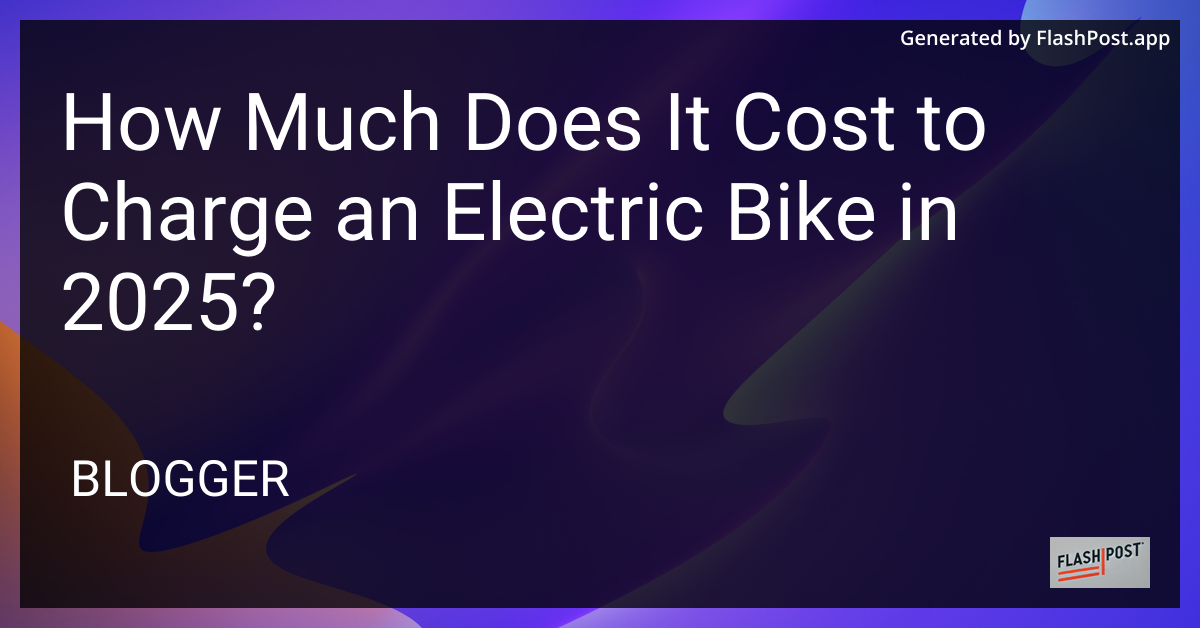How Much Does It Cost to Charge an Electric Bike in 2025?

Understanding the Cost of Charging an Electric Bike in 2025
Electric bikes are becoming increasingly popular as a convenient and eco-friendly mode of transportation. As we look toward 2025, one common question remains: how much does it cost to charge an electric bike? This article will break down the factors that influence charging costs and provide an estimated range for electric bike owners.
What Determines the Cost of Charging an Electric Bike?
Several factors influence the cost of charging an electric bike, including:
1. Electricity Rates
Electricity costs vary widely depending on your geographic location, the time of day, and the energy provider. In 2025, it’s expected that more regions will adopt dynamic pricing plans, which could affect the cost of charging during peak and off-peak hours.
2. Battery Capacity
The size of your electric bike’s battery directly impacts the total cost of charging. Typically, electric bike batteries range from 300Wh (watt-hours) to 800Wh. Larger batteries will naturally require more electricity to reach a full charge, increasing the cost.
3. Charging Efficiency
Not all chargers are created equal. Efficient chargers minimize energy loss during the charging process, while less efficient models may consume more electricity than necessary, increasing the expense.
Estimating the Cost to Charge an Electric Bike
To calculate the cost, you need to know your electric rate (usually in cents per kWh) and your battery’s capacity in kWh. For example, if your battery is 0.5 kWh (500 Wh) and your local electricity rate is $0.15 per kWh, the cost of a full charge would be:
[ \text{Cost} = \text{Battery Capacity} (\text{kWh}) \times \text{Electricity Rate} (\$/\text{kWh}) ]
Using the above example:
[ \text{Cost} = 0.5 \, \text{kWh} \times 0.15 \, \text{\$/kWh} = 0.075 \, \text{\$} ]
Therefore, a full charge would cost approximately 7.5 cents.
Projected Trends for 2025
- Increased Efficiency: With technological advances, expect more efficient batteries and better chargers, leading to lower electricity consumption.
- Renewable Energy Incentives: Some regions may offer discounts or incentives for using renewable energy sources, further reducing costs.
- Innovative Pricing Models: Look for energy providers to offer subscription services or flat-rate plans designed for electric vehicle owners.
Conclusion
In 2025, charging an electric bike will remain a cost-effective transportation option. Although prices can vary based on location and usage habits, the cost to charge an electric bike will likely stay within a few cents per charge.
For more insights on maximizing savings with your electric bike, check out our electric bike discounts and learn about transporting electric bikes. Additionally, familiarize yourself with the electric bike laws applicable to your location.
Stay informed and enjoy the ride!
”` This article is structured to be SEO-friendly by using relevant keywords and headers, providing valuable information in an easily digestible format, and incorporating links for further reading.
Comments
Post a Comment